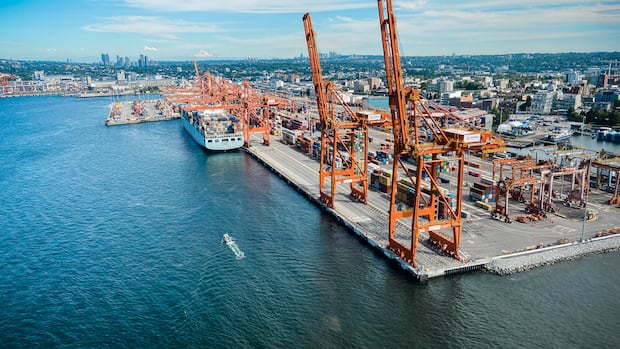A major trade artery was shut down on Monday when employers locked out more than 700 foremen at ports across British Columbia, sparking fears across the country for Canada’s supply chain.
With a partial closure already affecting two terminals at the Port of Montreal due to a separate labour dispute, this new stoppage could see more shipping backlogs for businesses as the window closes on importing goods for the holiday season.
The B.C. Maritime Employers Association (BCMEA) said they’d made the “difficult decision” to lock out workers Monday afternoon, after the International Longshore and Warehouse Union (ILWU) Local 514 issued a 72-hour strike notice for limited job action, which was set to begin at 8 a.m. PT on Monday. The lockout doesn’t apply to grain or cruise operations.
The union said its limited action consisted of an overtime ban and a refusal to implement tech changes on Monday if an agreement wasn’t reached. It previously accused BCMEA of “acting recklessly” by threatening the lockout.
Canada’s West Coast is its main trade portal for shipping goods by sea.
“Our West Coast ports handle $800 million worth of cargo every single day,” Pascal Chan, senior director of transportation, infrastructure and construction at the Canadian Chamber of Commerce, told CBC News. “That accounts for something like 25 per cent of the goods flowing through the country.”
What happens next
When the functioning of a major port is impacted, some ships that were supposed to bring goods to that port can end up anchored outside it, waiting for the strike to end. This is often the case for ships containing perishable food products, according to Fraser Johnson, a professor of operations management at the Ivey Business School with Western University in London, Ont.
But most ships are rerouted to other ports — which in this case means more goods intended for Canada being rerouted to U.S. ports on the West Coast, upping the end cost for Canadian businesses.
Freight rates have already increased threefold over the last year due to a number of factors, including problems in the Suez Canal and a drought in the Panama Canal increasing transit times for ships, Johnson said.
The B.C. ports being closed down “affects virtually everything,” he said, ranging from food and retail goods for the holiday season to commodities we export, like lumber, coal or automobiles.
“The general rule of thumb is that for every day that the port is shut down, it takes a week to be able to recover,” he said.
In Montreal, two terminals are also currently closed after longshore workers went on strike last week, paralyzing 40 per cent of total container capacity at Canada’s second-largest port. In an update last Thursday, the Montreal Port Authority stated that some ships already on their way to Montreal had turned back to other ports, and that many others were expected to follow suit.
The union’s main ask in B.C. is protections for job security amid increasing automation at the ports. In Montreal, work-life balance is one of the key points at stake for striking workers.
How consumers are impacted
The average Canadian isn’t going to see shortages on their grocery shelves or in retail stores in the short term, Johnson said. But if the labour dispute stretches on for several weeks, those impacts could trickle down as shipping costs add up.
“It might not be Day 1, but … when you start to see millions and millions of dollars in trade lost every single day, absolutely, Canadians are going to feel that,” Chan said.
Johnson said small- and medium-sized businesses will likely feel the impact first. Smaller operations don’t have the flexibility of larger ones in terms of contracts, which means increased costs and delays when shipment plans change.
When goods aren’t flowing through ports, that includes exports. The 13-day strike at B.C. ports last year saw B.C. exports fall 23 per cent in July 2023, hitting their lowest point since the pandemic, Chan said.
Fertilizer Canada, which represents Canadian producers and distributors of fertilizers, warned in a statement on Friday that a shutdown of the B.C. ports would cost their industry $9.7 million per day in lost sales revenue of potash fertilizer. Canada is the world’s largest producer of it.
Hundreds of foremen in Vancouver and Port Rupert were locked out by their employer, the B.C. Maritime Employers’ Association, on Monday afternoon, with the employer calling it a “defensive action” after port workers served 72 hours strike notice. The union says the BCMEA is overreacting.
Labour Minister Steven MacKinnon said in a Saturday post on X that “federal mediators are on site, ready to assist the parties,” but that it is the “responsibility” of the employers and the union to reach an agreement.
“Businesses, workers and farmers are counting on them to get a deal,” he said.
The labour disputes at Canada’s ports are just the latest in a string of supply chain disruptions, including a four-day strike at grain terminals in September and a temporary shuttering of Canada’s two biggest railways in the summer due to a rail strike.
Experts are concerned these disruptions could damage our reputation in international trade.
“Other partners globally have seen Canada as a reliable partner for conducting business,” said Hossein Piri, assistant professor with the Haskayne School of Business at the University of Calgary.
“So with continuous threats for supply chain in Canada, it can tarnish our reputation globally, and recovering that is not easy.”


